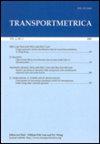Modelling activity generation: a utility-based model for activity-agenda formation
引用次数: 61
Abstract
This article presents an econometric modelling framework for activity-agenda formation. The activity-agenda is referred to the collection of different types of activities that are to be scheduled within a specific time period (time budget). The concept of activity utility is used to model frequencies of all individual activity types under consideration within a specific time budget constraint. Contrary to univariate modelling approach for individual activity types separately, this approach deals with all activity types together in a unified econometric modelling framework. The specification of the model also ensures the scope for unplanned (or not defined a priori) activities within the time budget. Kuhn–Tucker optimality condition is used to ensure the probability of having zero frequency of any specific activity type. Each individual activity-specific utility has two components: baseline utility and additional utility. The logarithmic function of additional utility ensures the satiation effect with increasing frequency. The heterogeneity in activity behaviour is also considered by incorporating error correlation in baseline utility. Data from the 2002–2003 CHASE survey, collected in Toronto are used to test the model specifications. Application of this modelling framework in an activity-based travel demand model will greatly enhance behavioural validity as well as sensitivity to subtle transportation policies of travel demand models.建模活动生成:活动议程形成的基于效用的模型
本文提出了活动议程形成的计量经济学建模框架。活动议程是指在特定时间段(时间预算)内安排的不同类型活动的集合。活动效用的概念用于在特定时间预算约束下考虑的所有单个活动类型的频率建模。与单个活动类型单独的单变量建模方法相反,该方法在统一的计量经济建模框架中处理所有活动类型。模型的规范还确保了在时间预算范围内的非计划(或未预先定义的)活动的范围。库恩-塔克最优性条件用于保证任何特定活动类型的频率为零的概率。每个特定于活动的实用程序都有两个组件:基线实用程序和附加实用程序。附加效用的对数函数保证了随频率增加而产生的满足效应。通过纳入基线效用的误差相关性,还考虑了活动行为的异质性。在多伦多收集的2002-2003年CHASE调查数据用于测试模型规格。将该建模框架应用于基于活动的出行需求模型,将极大地提高出行需求模型的行为有效性以及对微妙交通政策的敏感性。
本文章由计算机程序翻译,如有差异,请以英文原文为准。
求助全文
约1分钟内获得全文
求助全文

 求助内容:
求助内容: 应助结果提醒方式:
应助结果提醒方式:


